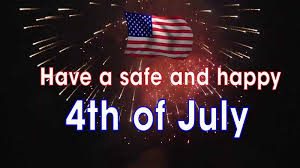FIREWORKS SAFETY TIPS
The best way to protect your family is not to use fireworks at home – period. The U.S. Fire Administration recommends attending public fireworks displays and leaving the lighting to the professionals.
- If you decide to use fireworks, it is important to ALWAYS follow the instructions and safety tips to reduce your risk.
- Never place any part of your body directly over a fireworks device when lighting the fuse. Back up to a safe distance immediately after lighting fireworks.
- Never try to re-light or pick up fireworks that have not ignited fully.
- Never point or throw fireworks at another person.
- Keep a bucket of water or a garden hose handy in case of fire or other mishap.
- Light fireworks one at a time, then move back quickly.
- Never carry fireworks in a pocket or shoot them off in metal or glass containers.
- After fireworks complete their burning, douse the spent device with plenty of water from a bucket or hose before discarding it to prevent a trash fire.
- Make sure you know your local laws regarding fireworks.
- Never allow young children to play with or ignite fireworks.
- Avoid buying fireworks that are packaged in brown paper because this is often a sign that the fireworks were made for professional displays and that they could pose a danger to consumers.
- Always have an adult supervise fireworks activities. Parents don’t realize that young children suffer injuries from sparklers. Sparklers burn at temperatures of about 1200 degrees.
Make sure fireworks are legal in your area before buying or using them.
Outdoor Cooking Safety
July is the peak month for grilling fires, followed by May, June & August. Stay safe: http://ow.ly/HyUG300fseO
- Declare a three-foot “safe zone” around the grill and above it.
- Periodically remove grease or fat buildup in trays below the grill so it cannot be ignited by a hot grill
- If you smell gas while cooking, immediately get away from the grill and call the fire department. Do not attempt to move the grill.
- All propane cylinders manufactured after April 2002 must have overfill protection devices (OPD). OPDs shut off the flow of propane before capacity is reached, limiting the potential for release of propane gas if the cylinder heats up. OPDs are easily identified by their triangular-shaped hand wheel.
- Use only equipment bearing the mark of an independent testing laboratory. Follow the manufacturers’ instructions on how to set up the grill and maintain it.
- Never store propane cylinders in buildings or garages. If you store a gas grill inside during the winter, disconnect the cylinder and leave it outside.
- July is the peak month for grill fires (17%), including both structure, outdoor or unclassified fires, followed by May, June and August
- Gas grills contribute to a higher number of home fires overall than their charcoal counterparts
- Keep an eye on what you fry. Most cooking fires start when someone is frying food.
- Watch what you are cooking. Fires start when the heat is too high. If you see any smoke or the grease starts to boil, turn the burner off.
- Make sure you are awake and alert. Alcohol and some drugs can make you sleepy.
- Wear short sleeves or roll them up so they don’t catch on fire.
- Make sure children and pets stay at least 3 feet away from a hot stove.
- Turn pot handles toward the back of the stove so no one can bump them or pull them over.

